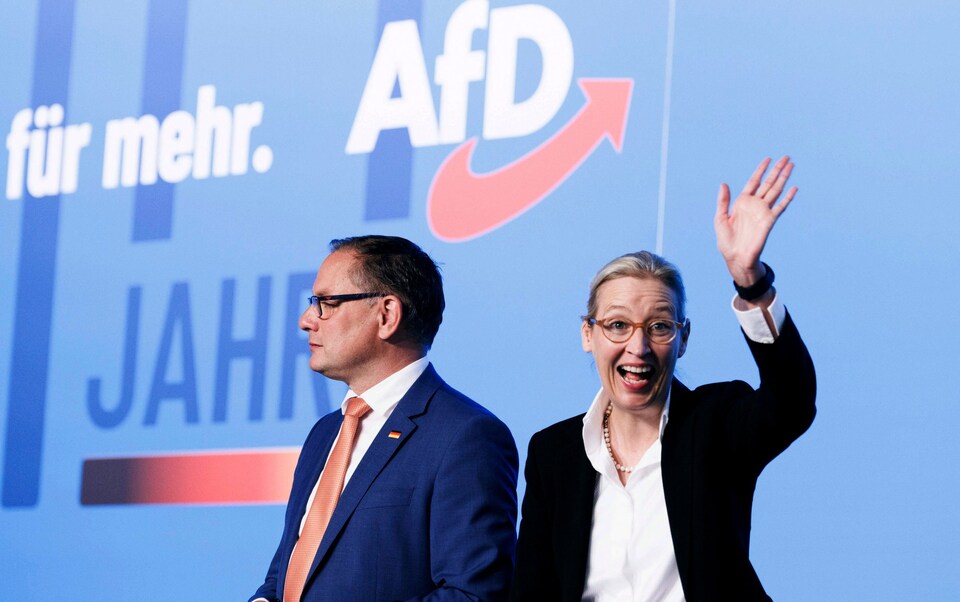A fierce debate has begun in Germany over whether the Far-Right Alternative for Germany (AfD) should be banned after some of its leaders took part in a meeting where consensus was to drive out the minorities even though the country’s Constitution has provisions for banning a party that works to that end. While mainstream parties smell in it the possibility of a return of the neo-Nazis to power, many of those who are opposed to AfD believe banning the party may prove counterproductive and will ultimately benefit the outfit. Fear for a rise of the Far-Right party stems from the fact that it continues to rise and is now the second largest party in the country.
The debate was sparked by a call given by Saskia Esken, the co-chief of the ruling Social Democratic Party (SPD) for discussing a ban on the outfit if only, as she put it, to “shake voters” out of their complacency. Since then, politicians from across the spectrum have been voicing their opinions both in favour and against the ban. AfD is increasingly proving to be a threat to mainstream parties. Last summer, it robustly won a district election for the first time since being founded in 2013. Like many Right-wing ultra-nationalist parties across the globe, it has increased its popularity by harping on xenophobia. This has brought rich dividends as the party has become second in national polls and it leads in three eastern states that will hold elections this autumn. As chancellor Olaf Scholz’s coalition government has struggled to navigate the multiple challenges of COVID, Ukraine, the cost of living crisis and the green transition, AfD has exploited widespread insecurity and hardship to strengthen its support base.
On 15 January, Scholz and his foreign minister, Annalena Baerbock, joined thousands of marchers participating in a demonstration in Potsdam to ‘defend democracy.’ The immediate trigger for the showdown was the revelation that last November, senior AfD figures met with other prominent Far-Right extremists to discuss a plan for forced mass deportations of migrants. The target of the attack included German citizens with migrant roots. Among those present was an adviser to the AfD’s co-leader, Alice Weidel. Such ideas are in flagrant violation of the German Constitution, which outlaws discrimination on the grounds of ethnicity. AfD’s leadership has distanced itself from the meeting, but it did not condemn those who attended it either. According to reports, the so-called ‘re-migration’ plan was agreed in principle by participants, though there were doubts over its feasibility.
All the same, the development has made Germans sit up as they are convinced dark forces reminiscent of Hitler’s Nazis are finding their way into the mainstream via the success of the AfD. In history, we rediscover the fact that Hitler’s National Socialist German Workers’ Party chose the path of electoral politics to exploit the people’s disenchantment with established parties and grab power. Germany’s domestic intelligence agency has previously termed several party organisations in eight of the country’s 16 federal states as either “proven to be Right-wing extremist” or “suspected to be Right‑wing extremist.” The shocking nature of the latest disclosures has led to calls for the AfD to be banned by the federal constitutional court. As the legal bar is too high to achieve this goal, critics of the clamour for ban fear such a step may make AfD even more popular and help them fulfil their aim of grabbing power.
Nevertheless, many in Germany believe the ban option may be necessary to make AfD’s moderate elements take control of the party. The Far-Right outfit has become a populist “vent” for a widespread resentment against the government. Addressing that will require greater political astuteness from the mainstream political class. The presence of Germany’s chancellor and foreign minister on Sunday’s march in Potsdam only shows how high the stakes are for the established parties. Germany may take a leaf out of India’s book as a ban on an ultra-right, communal outfit in the past only helped it grow from strength to strength until it has managed to occupy centre-stage of the country’s politics today.
